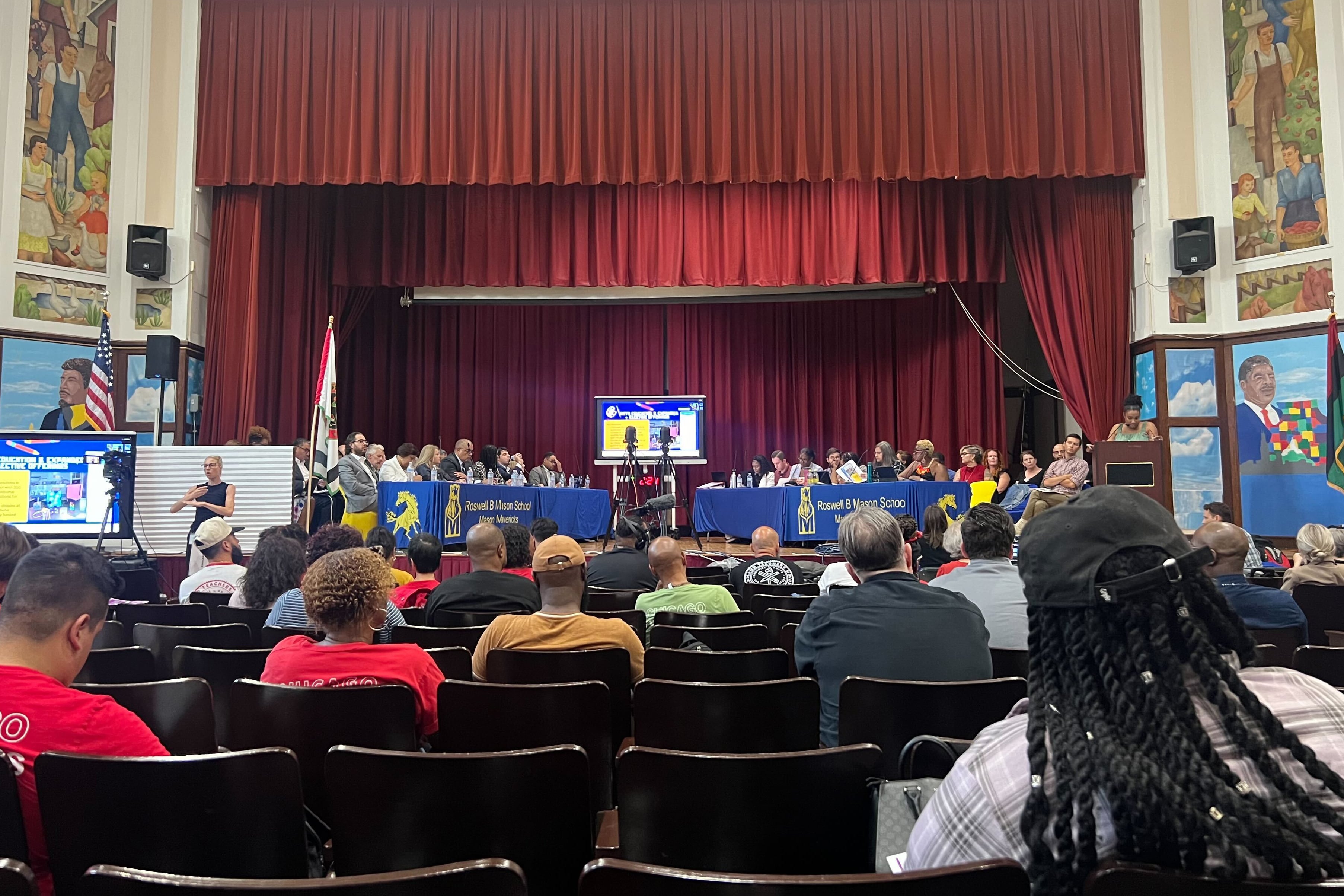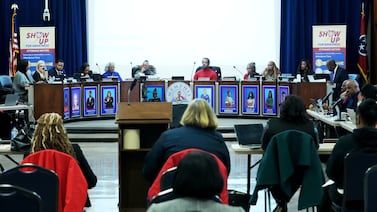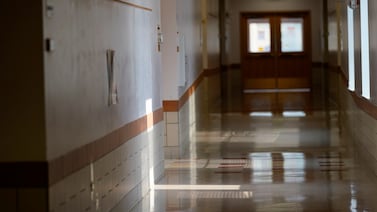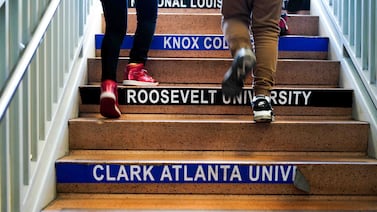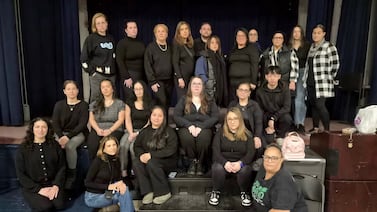Sign up for Chalkbeat Chicago’s free daily newsletter to keep up with the latest education news.
When Chicago Public Schools students head back to class later this month, their teachers likely won’t yet have a new contract.
In the past, that was a bad omen, signaling that a strike loomed. This year, a strike does not appear to be on the horizon, and both sides have said the tone at the bargaining table has been more amicable.
But by most accounts, the district and the Chicago Teachers Union have made little headway in the high-stakes negotiations that began this past spring. The CTU is pushing for its most far-reaching package of proposals, which includes 9% annual raises, more school support staff, smaller class sizes, and efforts to address homelessness and the challenges migrant families face.
Those demands come as the district and city face budget deficits, with no clear path to securing extra funding for schools. Illinois lawmakers and Gov. J.B. Pritzker have balked at appeals to steer more dollars to Chicago schools. Meanwhile, district leaders and the school board have said they are wary of adding to the district’s already considerable debt burden after Mayor Brandon Johnson encouraged them to take out a short-term loan to cover some contract costs and ward off cuts.
After years of contentious relationships with mayors, the union is now negotiating with a district overseen by Johnson, a former CTU employee whom it helped propel into office. His critics had argued during last year’s mayoral race that he would readily sign off on the union’s demands, no matter the cost, even as he shot back that he would be best positioned to “deliver bad news” to his friends in the union.
Neither scenario has played out so far, according to sources on both sides.
The union has struck an increasingly combative tone. Tensions have spilled out at two public bargaining sessions; a third one focused on financial issues is slated for Tuesday evening.
In an interview with Chalkbeat, Board of Education President Jianan Shi, who is not involved in daily negotiations but will eventually vote to approve a deal, said he expected by now that both sides would have “made more progress.”
“I think the people of Chicago want to see us finding alignment, demonstrating that we can work together, and doubling down on things we know that improve student outcomes and the student experience,” Shi said.
Bargaining may bleed past the Nov. 5 school board elections, according to multiple sources with knowledge of the pace of negotiations. And if that happens, it could mean whatever agreement district and union leaders reach could come before the new 21-member board that will be sworn in on Jan. 15, including 11 mayoral appointees.
CPS did not respond to Chalkbeat’s questions or multiple requests for an interview. City Hall declined to comment.
A 9% raise, more support staff, and less learning time
The union is proposing hundreds of substantial edits or new additions to its current contract, from more prep time for elementary school teachers and making school buildings more environmentally-friendly to providing housing assistance for homeless students and dollars for transportation, mental health services, and academic support for immigrant families seeking asylum.
In its opening proposals, the union asked for a 9% pay increase and salaries that don’t dip below $46,500, or 150% of the federal poverty level. The average teaching assistant salary — a group represented by the CTU — is now about $44,000.
The starting salary for teachers is $61,990, according to the current contract. A Chalkbeat analysis of compensation data shows a regular teacher makes about $92,500 a year on average, up from $78,400 in 2019. Teacher pay varied significantly, with head teachers, who play key leadership roles on their campuses, making almost $115,000 on average, while high school support teachers average about $88,000.
In the recent past, CPS has agreed to raises of up to 4%, and an internal district memo obtained by Chalkbeat last month contemplated 4% for the coming year, which the district estimates would cost $120 million. Though comparing compensation across districts and states is tricky, Chicago teachers are better compensated than many others. One pandemic-era study from the National Council on Teacher Quality put CPS at No. 1 for teachers lifetime earnings among 90 large districts.
But union leaders have said their main focus is on proposals aimed at beefing up support for schools and students. Those include librarians in every school, air conditioning in all gymnasiums by 2026, in-home counseling for students who have experienced trauma, class sizes of between 20 to 25 students depending on the grade, and even smaller classes for those that include at least one child learning English.
Zeidre Foster, the union’s head of grievances and member of the district’s bargaining team, said the two sides have reached several tentative agreements on low-cost proposals that likely won’t excite members, such as around professional development. The tone at the table remains collaborative, she said.
But overall, progress has been slow.
“The most frustrating part at this point is the lack of urgency,” she said. “We are looking to transform the district, and CPS is stuck in the status quo.”
The union has gotten a small number of proposals from the district and some counter offers on CTU demands, she said; there has been no response on the union’s compensation proposal.
One major issue CPS and CTU are far apart on is providing additional preparation time for elementary school teachers, according to two sources familiar with negotiations. The union has argued that elementary school teachers need more time to plan engaging lessons. The current contract allows for an hour of preparation time a day. The district says more preparation time means less learning time for students amid ongoing pandemic recovery.
The union unsuccessfully demanded a similar proposal during 2019 contract negotiations.
In a July letter to CPS families, Martinez called negotiations “fruitful.” In the most recent public bargaining session at Roswell B. Mason Elementary School in North Lawndale, district officials also opted for an upbeat tone, highlighting additional investments they’ve made in schools, as well as average class sizes of 20 students in elementary schools and 20 students in high schools.
The 330,000-student district’s payroll has grown by roughly 8,200 full-time positions since 2019, to about 46,670 positions, according to district data.
But CTU members, a student, and union President Stacy Davis Gates, who unsuccessfully pressed the district to codify those class sizes in the teachers contract on the spot, offered a dimmer view. They highlighted some of their top issues, such as a lack of librarians at every school and the need for more early childhood classes for students with disabilities.
“I’m actually struggling right now trying to understand how we are going to come to some agreement and settlement of this contract,’” Davis Gates said during the bargaining session, adding that she wanted the district to acknowledge that there are problems in need of solutions.
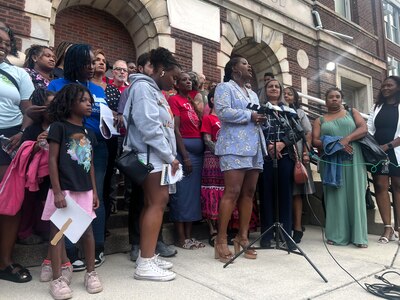
Proposals such as dedicated space for social workers and nurses are reasonable to Tyrone Palmer, a social worker at Walter Payton College Prep and one of hundreds of union delegates who voted to approve the proposals. Palmer’s biggest wish is for more staff inside buildings, including librarians, paraprofessionals, and social workers.
Palmer said he supports the union wielding its power to improve problems that fall outside of teacher pay and benefits and address broader problems, such as homelessness.
“When there are societal issues, that affects our jobs and if that comes in through the schools, it’s hard to educate a student,” Palmer said.
But he noted that contract talks are going more slowly than he had expected.
“When Brandon Johnson got elected, I remember thinking, one, we’re gonna ask for a super extravagant proposal and two, we’re gonna somehow get everything we ask for,” Palmer said. “It’s a harsh reality check of, ‘No … it’s still very slow-going.’”
Unknown contract costs prompt questions of cuts, borrowing
CPS budget will need amending once contract costs are known
The question of how to pay for a new contract looms over the negotiations as the district faces budget deficits that could approach $1 billion in the coming years.
The Board of Education would have to amend its already-passed budget once the contract is settled. Both Pritzker and State Superintendent Tony Sanders have made it clear that the state won’t be providing more money this year. Without additional dollars, the district will have to make cuts in order to pay for costs related to the new contract.
CPS is providing “budgets that do not include what we need,” Davis Gates told reporters after another public bargaining session this month. “And what we need are actual bodies in classrooms, teaching our young people. We need a sports program. We need an arts program — not a smorgasbord of things that you may or may not get.”
Asked what funding options are available and if CPS will take out a loan, Board President Shi said “everything is on the table,” but declined to elaborate further. More details could be revealed during the third public bargaining session on Tuesday.
Joe Ferguson of the Civic Federation, an Illinois-based nonpartisan government research group, questioned the district’s decision to pass a 2024-25 budget without any dollars for the cost of the new teacher contract. District officials could have estimated those costs and baked them into the document for a more clear-eyed plan to navigate the rough financial waters.
But it’s not a surprise the district did not do that, given the charged politics of attempting to guess at those costs, Ferguson said. Mayor Johnson has said he will not accept significant cuts to district programs or staff.
Ferguson noted the district significantly expanded its workforce and operations during the pandemic.
“You could be reductionist and say the governor is saying no,” he said. “Or you could argue the governor is saying, ‘We won’t come to the rescue of a system that hasn’t shown it is willing to do the work of reducing some costs firsts.’”
Hal Woods of the advocacy group Kids First Chicago says the group’s leadership and parent network are supportive of higher teacher pay and really like some of the proposals to beef up student support. But they are concerned about the cost of the proposal.
They also have concerns about proposals that would give new powers to Professional Personnel Leadership Committees, advisory bodies made up of educators and other staff that campuses convene under state law. The union wants these committees to have more control over curriculum, professional development, principal evaluations, and more, in some ways, potentially sidelining local school councils and school leaders.
In 2019, contract talks led to an 11-day strike, when union leaders insisted Mayor Lori Lightfoot was squarely in the driver’s seat and lambasted her for not meeting their demands. The same was true in 2012 when CTU leadership sparred with then-Mayor Rahm Emanuel over the length of the school day and year and teacher performance evaluations.
But this time around, the union has blamed Martinez for standing in the way of an agreement, calling him a “Lightfoot holdover” who lacks vision for CPS, though he, like his predecessors, serves at the mayor’s pleasure.
“Disparaging the CEO doesn’t make state legislators or Chicagoans for that matter interested in letting more of their money go to the district,” Woods said.
The union also changed its stance on a $175 million payment from CPS to the city’s pension fund. The union had sharply criticized Lightfoot for passing the payment on to the district, but it now says that the district should cover it, empowering Johnson to pursue a progressive agenda in City Hall.
A City Hall spokesperson said Johnson’s deputy mayor of labor relations, Bridget Early, has been involved in the talks. But Johnson has largely refrained from commenting on them publicly, and union officials said direct reports to Martinez rather than Johnson administration staffers have been on the frontlines.
Brad Marianno, an education labor expert at the University of Nevada, said the CTU remains a trailblazer in promoting the kind of expansive education and social justice contract talk agenda known as “bargaining for the common good.”
The union’s latest set of proposals is the most far-reaching and voluminous Marianno has seen in Chicago or anywhere else. But he said the pushback to taking on more debt to fund recurring expenses such as salaries is understandable because doing so would be “wildly irresponsible.”
And while support for educators remains strong in urban districts such as Chicago, Marianno believes even here, there is little appetite for a teacher strike among parents and community members on the heels of extended remote learning and other COVID-era disruptions to learning.
Mila Koumpilova is Chalkbeat Chicago’s senior reporter covering Chicago Public Schools. Contact Mila at mkoumpilova@chalkbeat.org.
Reema Amin is a reporter covering Chicago Public Schools. Contact Reema at ramin@chalkbeat.org.

